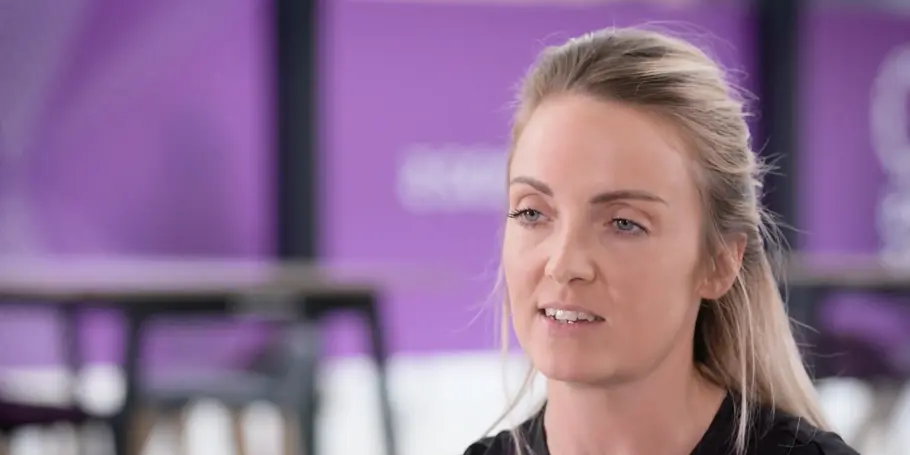- HomeStudyApprenticeshipsSenior Leader Apprenticeship Postgraduate Diploma Senior Leadership
Senior Leader Apprenticeship Postgraduate Diploma Senior Leadership
A Senior Leader Apprenticeship focusing on strategic leadership development and funded through the Apprenticeship Levy, with an optional Masters (MSc) in Senior Leadership.

Accredited by the ILM
This programme helps aspiring middle and senior level leaders develop the Knowledge, Skills, and Behaviours to further advance their career and lead to a level of excellence recognised nationally by the Senior Leader Standard.
There are eight core units which drive personal growth and organisational impact.
Each module explores key universal leadership themes with contemporary leadership challenges, informed by leading research and theory, delivered by world class lecturers.
The content in each unit links to specific Knowledge, Skills, and Behaviours within the Senior Leader Apprenticeship standard.
Through the online learning, apprentice learners will be directed to undertake work-based activities, from which they will generate evidence of how they demonstrate the apprenticeship standards, which will form part of their professional portfolio.
This delivers greater leadership impact for the individual, their team, and their organisation.
You can explore the programme modules on this page or check the programme architecture.
-
Fees:
- £14,000 (funded by the Apprenticeship Levy)
MSc Senior Leadership: additional £4,000 (non-levy funded) -
Duration:
- 18 months
Part-time
Average study time: approx. eight hours per week -
Programme starts:
- June 2025 (applications closed)
November 2025 (subject to L7 funding) -
Delivery:
- Face-to-face workshops, group learning, reflective discussion, self-guided study
-
Location:
- Manchester
Programme modules
15 credits
This unit focuses on how leaders can be authentic, relevant and create a conducive and inclusive culture for organisation performance to support sustainable growth in a post-pandemic era.
You will learn how to develop your leadership identity and leverage your personal brand to influence key stakeholders, create a culture of collaboration, challenge more effectively, support high performing teams and turn strategy into action through inclusive, effective, and inspirational communication.
15 credits
This unit draws on related fields of strategy, culture, and marketing to explain the fundamental drivers of organisation performance to deliver differentiation and growth.
You will learn to how to utilise strategic models, marketing, and brand to understand challenges, scan the strategic horizon, map external opportunities to internal capabilities, identify strategic choices and formulate appropriate strategies.
15 credits
This unit focuses on the strategic priorities of workforce planning, skilling, employee engagement, remote working, equality, diversity and inclusion, and employee resilience in light of the pandemic.
You will understand how the pandemic has changed organisations’ business models and people's jobs and the impact that has on strategic workforce planning, employee motivation, job performance, team dynamics, and engagement.
You will also learn how to build an open and an inclusive culture, encouraging diversity and difference, promoting wellbeing enabling a high-performance working environment.
15 credits
The unit focuses on the importance of embracing disruptive technologies and utilising big data to support resilience in a global digital era.
You will learn how to develop the skills and capabilities needed to meet the leadership challenges posed by innovation and entrepreneurship and to identify drivers of organisational change, including big data, and how to lead change in the workplace.
15 credits
This unit outlines the importance of the role of finance as part of a business strategy to achieve sustainable growth.
You will gain an understanding of how to combine financial accounting and management accounting with economic theory, financial modelling, and supply and demand to underpin financial strategies.
You will also learn to analyse and interpret financial statements, risk management, financial ratios and challenge the financial assumptions underpinning strategies. Finally, you will learn to embrace financial governance and support internal ethical standards and compliance with external standards.
15 credits
This unit focuses on the importance of equality, diversity and inclusion, corporate integrity, and good governance for sustainable growth and managing brand reputation.
You will learn how to leverage business ethics, corporate social responsibility, sustainability, and environmental social governance to address strategic challenges facing organisations with respect to eco-innovation sustainable consumption and the UK Net Carbon Zero by 2050 target.
15 credits
In this unit, you will reflect on your apprenticeship journey and demonstrate your competence against the occupational standard using workplace examples, and ultimately, prepare for your professional discussion at End Point Assessment (EPA).
You will complete a leadership personality psychometric tool and analyse results to create a personal development plan to guide your development as a senior leader throughout the programme, commence a portfolio of evidence against the Knowledge, Skills, and Behaviours in the Senior Leader Apprenticeship Standard, and undertake an oral presentation in relation to the development of the portfolio of evidence to date.
You will be required to draw together your learnings and personal development from previous units and consider the organisational impact you have made as a result.
Completion of this unit will enable you to confidently progress onto Stage Two of your personal and professional practice journey.
15 credits
During this unit you will undertake a critical reflection of your apprenticeship journey. This includes a formal presentation which provides experience of, and preparation for, the various assessment methods in final End Point Assessment (EPA).
You will complete your portfolio of evidence demonstrating the various Knowledge, Skills, and Behaviours within the Senior Leader Apprenticeship Standard. This portfolio is an essential component which will directly contribute to the EPA process.
Completion of this unit will enable you to move towards Gateway (point between apprenticeship training and EPA), EPA and on to successful completion of your Senior Leader Apprenticeship.

The programme focused on applying theory and concepts to real-life situations, and helped address a myriad of challenges as my business has evolved its strategy and business model.
Key Information
The programme will be delivered through a blend of face-to-face workshops, group learning, reflective discussion, one-to-one coaching, and self-guided study.
The programme has been specifically designed to align closely with day-to-day roles: underpinning your working practice with a solid understanding of contemporary management and leadership theory, and the senior leader apprenticeship embedded throughout.
- Personalise your development through an emphasis on reflective practice, psychometrics, and coaching
- Focus learning though practical, work-based modules, applying new knowledge and skills to real business and organisational issues through reflective practice papers
- Build your confidence to ask difficult questions and make informed decisions
- Individualised assessment approach allows you to focus on the challenges you face as a professional leader
- Equip yourself with strategic leadership skills to support your organisation’s performance and long-term sustainability
- Improve your management and leadership skills by combining work and study, with a minimum of eight hours per week spent off the job undertaking the course and relevant development activities
- Upskill your project management capability
- Develop confidence and agility as a leader
- Network and learn from fellow apprentice learners from a wide range of sectors and backgrounds
Employers with a payroll above £3m per year contribute to the Apprenticeship Levy on a monthly basis. This fund can only be spent on approved apprenticeship programmes and accrues on a monthly basis. This fund expires if unspent after 24 months.
Employers can use their levy funds, to invest apprenticeships for several strategic benefits:
- Growing their own senior leaders
- Attracting and retaining talent in their organisation
- A pathway for succession planning
- Part of wider strategic organisation development plans
- Supporting a strategic agenda, for example, promoting Equality, Diversity, and Inclusion
The Senior Leader Apprenticeship Postgraduate Diploma Senior Leadership is for middle to senior level leaders who are:
- Aspiring to take on a more senior leadership role and increase their organisational impact
- Ready and committed to developing their leadership skills and behaviours whilst undertaking an academic qualification
- Motivated by the opportunity to apply new skills, learning and behaviours directly to real-time, work-related improvements
Previous apprentice learners at Alliance MBS have job roles including Operations Manager, Finance Manager, HR Manager, Senior Project Engineer, Director, Chief Executive Officer, Managing Director and Partner.
- 6 x group presentation
- 10 x individual assignments
- Personal development plan
- Analysis of personal development journey
- Portfolio of evidence plus oral presentation
- Strategic business proposal: applying your learning to real world change project
- Portfolio review and professional discussion at End Point Assessment
- Optional Masters (MSc) Pathway: Dissertation
Personal tutor/coach: university support for learning
Work-based mentor: employer support for learning
Protected time: a minimum of eight hours per week off-the-job learning
Online learning platform: online learning materials
A degree is not an essential requirement for entry on to the course as there are different routes to apply:
- A First or Upper Second-class honours degree (2:1) plus three years’ management experience (with strong and consistent career progression and achievement).
- A Lower Second- or Third-class degree or equivalent professional qualification plus five years’ management experience (with strong and consistent career progression and achievement).
- No degree, but five years’ management experience (with strong and consistent career progression and achievement).
- All routes require GCSE Maths and English at grade C or above or equivalent qualification.
Level 7 Senior Leader Apprenticeship: £14,000 (funded by the apprenticeship levy)
Optional Masters (MSc) in Senior Leadership: £4,000 (non-levy funded)
Apprenticeship funding for employers:
Employers with an annual payroll of more than £3 million pay 0.5% of their payroll into the Apprenticeship Levy. The government adds 10% to each monthly levy payment. The levy payment is held in a digital account, which is set up at the apprenticeship service. Each individual’s training costs are deducted from the account and paid to the provider monthly.
The system is different for employers who have a pay bill of less than £3 million. Any training and assessing costs are shared with the government, with employers paying 5% and the former covering the remaining 95%. These employers agree on a payment schedule with the provider.
The Senior Leader Apprenticeship Postgraduate Diploma Senior Leadership can be funded using Apprenticeship Levy funding. Apprentice learners do not contribute to the costs of their apprenticeship, as costs are included in the Senior Leader Apprenticeship*.
*The optional Masters (MSc) in Senior Leadership requires an additional £4,000 fee.
Dr Paul Evans, Programme Director
Dr Paul Evans is a lecturer in Leadership and Management Development and teaches at Undergraduate, Masters, and Executive Level. As Programme Director, Paul is responsible for the academic content and processes of the postgraduate diploma and senior leader apprenticeship.
- Accreditation at Level 7 Senior Leader Apprenticeship Standard
- Postgraduate Diploma (PGDip) or Masters (MSc) Senior Leadership awarded by The University of Manchester
- Professional recognition award MCGI (Member City and Guilds Institute)
- Member of the Institute of Leadership and Management
Your employer must agree to support your development time. They must release you to complete your studies with the university and attend other development opportunities.
The minimum statutory requirement for all apprenticeships is equivalent to approximately six contracted hours per week. However, you should you should expect and plan for at least eight hours per week to get the most out of the programme.

It can be daunting when you first start off on the programme. There’s a lot to think about, so it’s important to know you will be supported throughout your development journey.
Teaching and Learning
What makes the Senior Leader Apprenticeship Postgraduate Diploma Senior Leadership different is the support provided to learners throughout their development journey.
Your personal tutor provides the academic and pastoral support needed for this programme. Consistency is key, which is why you keep the same tutor throughout the programme. The tutor supports you through:
- Coaching, leadership and personal development
- Feedback and marking practice for work-based assignments
- Online facilitation and communication
- Detailed understanding of the programme content
- Regular progress reviews in partnership with the employer and work-based mentor
The role of the work-based mentor is essential in providing the work-based support you will need for this programme. You will need to work with your employer to identify a suitable mentor to support you throughout the programme. Your work-based mentor will:
- Provide advocacy, support and sponsorship for you within the organisation
- Give input and support for progress reviews
- Ensure you are supported with a minimum of 6 hours of off the job learning
- Validate the submission of evidence of work-based competencies
- Approve and support your choice of work project
- Contribute to the readiness for end point assessment
The online learning platform is an interactive online platform, which supports you throughout the programme. The online learning platform is where you can find all the resources you'll need, including e-learning nuggets, simulation events, webinars, videos, psychometric assessments, surveys, electronic journals and books, tutorial and discussion boards, learning journals and social networks.
To help support your learning and progress, you will attend a review with your personal tutor and work-based mentor every eight weeks. During these meetings, you have the chance to review what has been achieved and set goals for the next two months.
The University uses APTEM, for both processing applications and the management of the apprenticeship learning experience. APTEM enables apprentice learners and their employers to have their applications, enrolment and learning logged and tracked on one system whilst complying with apprenticeship standards. After application, APTEM continues throughout the apprenticeship journey, alongside other classroom, blended delivery and online learning. You will build your apprenticeship portfolio inside APTEM throughout the programme.
There are six face-to-face behavioural development workshops during the course of the programme. You will also have individual and group tutorials over the duration of the programme. These will take place either online or face-to-face.
Unit 1
10 weeks | 15 credits
- 1,500-2,000-word assignment
- 1 group presentation.
Unit 2
10 weeks | 15 credits
- 1,500-2,000-word assignment
- 1 group presentation.
Unit 3
20 weeks | 15 credits
- 1,500-2,000-word personal development plan
- 1500-2,000-word portfolio of evidence
- 1000-word oral presentation.
Unit 4
10 weeks | 15 credits
- 1,500-2,000-word assignment
- 1 group presentation.
Unit 5
10 weeks | 15 credits
- 1,500-2,000-word assignment
- 1 group presentation.
Unit 6
10 weeks | 15 credits
- 1,500-2,000-word assignment
- 1 group presentation.
Unit 7
20 weeks | 15 credits
- 1,500-2,000-word analysis of personal development journey
- 1,500-2,000-word portfolio of evidence
- 1,500-word oral presentation.
Unit 8
10 weeks | 15 credits
- 1,500-2,000-word assignment
- 1 group presentation.
How to apply
If you want to apply for the programme, please complete the following steps:
Step 1 - Talk with your employer, both your line manager and apprenticeship lead, provide them with details on this programme and make sure that you have their approval before you apply.
Step 2 - Complete the online eligibility checker, which will give you an indication as to whether you are eligible for funding.
Step 3 - Assuming you are eligible, please use the 'Book a consultation' form to speak to a member of our team where we can review your eligibility and CV.
Speak to a team member
If you have any questions or would like to chat to us about this programme and how it could benefit you, please get in touch with the programme advisor.

Rosie Gill
Head of Client Relations
Related Courses





